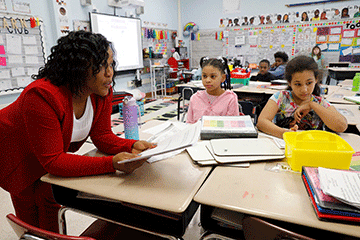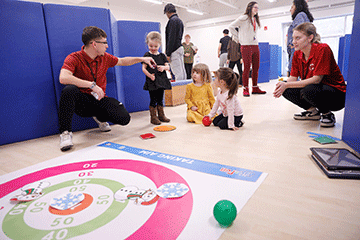News Detail
04/06/2024

SUNY Cortland will receive almost $2 million in state funding to help ease the nation’s teacher shortage by creating alternative paths for adults already working in schools to become certified teachers.
“The point of these grants is to work with district partners in our region to create alternative pathways to teaching that can help teaching assistants and paraprofessionals to continue in their jobs while working on their teaching credentials,” said Andrea Lachance, dean of SUNY Cortland’s School of Education.
“These types of certification pathways are for career changers. The hope is that these alternative pathways will allow more people to enter the teaching profession and help address regional teaching shortages.”
SUNY Cortland is one of only two SUNY institutions to win part of a $13.6 million package of Workforce Development awards announced Friday by Governor Kathy Hochul and the New York State Office of Strategic Workforce Development. Cortland was also the only higher education institution to win awards in both of the programs funded. A total of 12 New York state colleges and universities received grants.
SUNY Cortland was allocated roughly $1 million each through the two programs — the Alternative Teacher Certification Program and the Upskilling Paraprofessionals Program — to provide opportunities for adults who aren’t in college but are interested in becoming certified educators.
“The Alternative Teacher Certification Program is a pathway to the teaching profession that may help reduce time and cost barriers for candidates interested in a teaching career,” said New York Governor Kathy Hochul. “This program provides funding to expand existing alternative teacher certification programs or develop and implement new high-quality, research-based, graduate-level alternative teacher certification programs.”
The Upskilling Paraprofessionals Program targets individuals who are already working in schools as teaching assistants and are an essential part of the teacher pipeline given their prior classroom experience and strong connections to the communities they serve.
SUNY Cortland’s School of Education runs the largest public teacher education program in New York state, and one of the largest in the nation. As such, it will play a key role in producing new educators to address the shortage plaguing school districts throughout the country.
During the five-year project, most of the funds spent at SUNY Cortland will take the form of direct support for student tuition and fees for approximately 30 students per year.

One of these grants will support tuition and fees for teaching assistants and substitute teachers in local schools who already have a bachelor’s degree and who are looking to earn teacher certification through alternative pathways.
The university’s second grant will support tuition and fees for teaching assistants in local schools who don’t have a bachelor’s degree and are looking to earn both their degrees and their teaching credentials at the same time.
To identify prospective participants for the program, the university will work closely with three regional Boards of Cooperative Educational Services (BOCES): Onondaga-Cortland-Madison, CiTi (Oswego), and Tompkins-Seneca-Tioga. Lachance noted that OCM BOCES alone has around 400 teaching assistants.
Participants in either grant program will take all their coursework either at SUNY Cortland or at grant partner Tompkins Cortland Community College (TC3).
The initiatives represent a sea change from the tradition of recruiting new first-year students to complete a two-year community college degree or four-year baccalaureate degree in education.

Candidates will likely be people who already are working in some capacity with children from pre-kindergarten through high school, according to Lachance, and their post-secondary levels of education are likely to differ widely.
“It’s really focused on taking people who are already working in school systems and don’t have certification and helping them to get what they need to get those teaching credentials,” she said.
The university will work hard to ensure the teacher candidates can earn their required classroom observation hours and student teaching semester in their current workplace.
“We’ll have to create some alternative coursework or avenues for them to complete field hours on the job,” Lachance said. “That’s the other barrier to people wanting to teach when they are already on the job. They’ll be allowed to get their field hours and, if needed, their student teaching while they are working.”
“These programs dovetail nicely with our new program development supported by SUNY Transformation Funds, including the online Bachelors in Integrated Studies and the online Master of Science in Teaching in Adolescence Education,” said Lachance.
Grant funding is set to begin on July 1, 2024, according to Lachance, and the first year will be a planning year. Participants in the program will likely begin their studies in the 2025-26 academic year.
On campus, Lachance worked closely with her colleagues Dom Fantacone, director of research and sponsored programs, who supported the proposal writing and project budget creation, and Joseph Menard, visiting assistant professor in foundations and social advocacy, who works closely with school districts in our region. Additional support in preparing these grant proposals came from Colleen Viggiano, deputy superintendent, OCM BOCES; Matthew Cook, district superintendent, OCM BOCES; Christopher Dodd, district superintendent, CiTi (Oswego) BOCES; Jeffrey Matteson, former district superintendent, TST BOCES and current senior deputy commissioner for education policy at NYSED; and Victoria Zeppelin, director of CollegeNow, Tompkins Cortland Community College.
“As New York state’s largest teacher education provider, SUNY is dedicated to preparing the next generation of educators who will inspire students to pursue their dreams,” said SUNY Chancellor John B. King Jr. “We need more New Yorkers to join the ranks of our teaching profession and thanks to Governor Kathy Hochul, these workforce development grants will have a significant impact on expanding our programs to prepare more excellent diverse future educators.”

